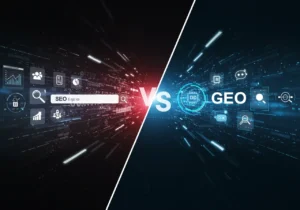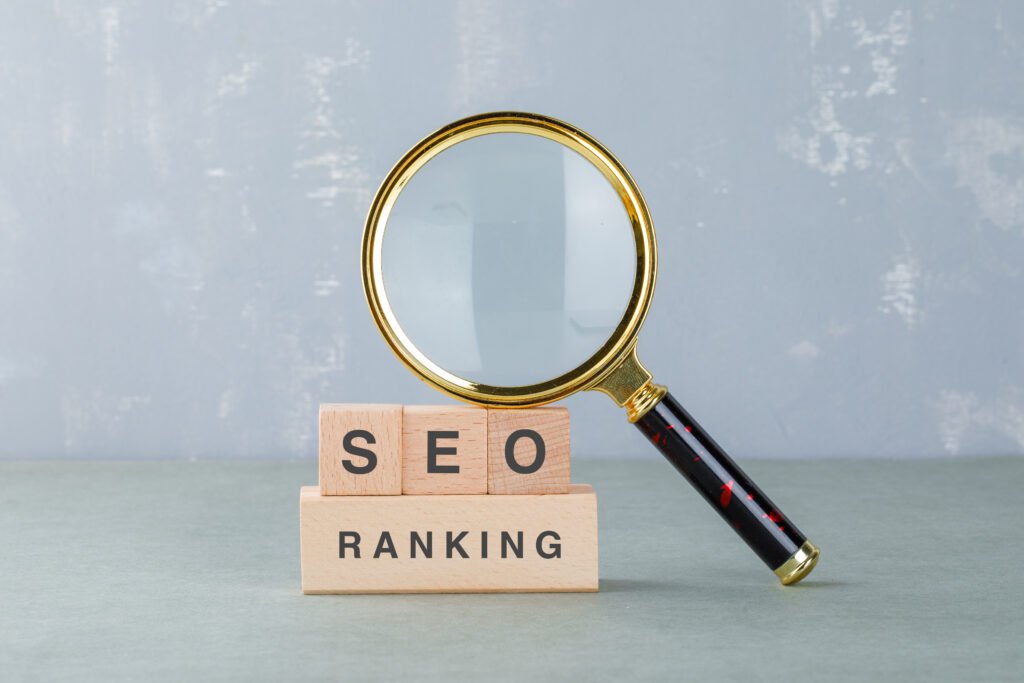GEO vs SEO – Understanding the Differences

Introduction
GEO vs SEO signifies a fundamental change in our approach to digital visibility in today’s AI-assisted search environment. The idea of SEO (Search Engine Optimization) has traditionally defined optimizing web experience to rank higher on traditional search engines like Google by using keywords, backlinks, and resequencing site health. SEO is built on creating traffic by making you visible on the search engine results pages (SERPs) for users to click through to your site.
In comparison, GEO (Generative Engine Optimization) considers the new wave of AI-assisted search platforms that include ChatGPT, Microsoft Copilot, Google AI Overviews, etc., which generate unified, summary responses when users search in these conversational formats. AI-based search platforms are parsing previously trusted and authenticated web-based content, so GEO is built on how frequently and accurately your content is referenced in cognitively summarized AI-generated responses, irrespective of a users’ web-based click through.
This key difference shows why both GEO and SEO will be more critical than ever (and complement each other) in 2025. While SEO focuses on organic traffic by generating organic rankings in the traditional search results, GEO extends your reach by putting your brand front and center in an AI-based answer, immediately building perceptions with your audience.
A handful of recent studies indicate that conversational AI tools are beginning to account for a larger share of web queries. Marketers who leverage both GEO and SEO are ensuring they are dominant when it comes to digital discovery through multiple search environments. Understanding “GEO vs SEO” isn’t just important—it’s now a strategic necessity to stay visible in the next generation of digital marketing.
What is SEO ?
Have you ever noticed how some websites always get ranked first on Google and get thousands of visitors? That’s the power of SEO (Search Engine Optimization). Studies show that 68% of online experiences start with a search engine. Therefore, SEO is a significant factor in increasing organic traffic to websites.
SEO is focused on optimizing a site so that it will rank higher naturally (without paid ads), when a user searches using keywords related to your business. This will include traditional SEO practices such as:
- Using relevant keywords intentionally throughout your content
- Building quality backlinks to authoritative sites
- Making sure your site is fast, mobile-friendly, and easy to navigate
These practices will help improve your organic ranking, which helps your site cover the first page of search results, increasing the chance people will click to come visit. In fact, according to Google, sites on the first page of a search result can receive up to 92% of all traffic for that search.
Within the confines of GEO vs SEO, traditional SEO is still the backbone of optimizing your content for organic keyword ranking. The purpose of SEO is to optimize your content to be discovered by the search engine because your potential client is actively searching for that information as an answer to their question. However, with the rise of AI-driven search engines providing immediate answers to search inquiries via AI, SEO alone is only an aspect of ensuring your digital visibility. Have you considered how SEO fits into the large scheme of AI-driven search inquiries? This takes us to how SEO works in conjunction with GEO in today’s evolving world of marketing.
What Is Generative Engine Optimization (GEO)?
Have you observed that more people are harnessing AI chatbots such as ChatGPT or Microsoft Copilot to get immediate answers than clicking through to access traditional search results? In fact, recent research shows 65% of marketers are adjusting their plans to gain visibility in AI-powered search engines, making GEO Vs SEO a relevant topic for 2025 and the future.
Generative Engine Optimization (GEO) is the new term for optimizing your content to work with, or be found by, generative engines, or AI. Traditional SEO is focused on ranking your site in search engine results pages (SERPs), while GEO processes the concept of ranking by attempting to get your content cited and repurposed within generative AI’s summaries and conversational responses to questions. Your content is often exposed to searchers who receive their answers within the AI and never clicks through to a website.
Key differences GEO Vs SEO include:
Objective: SEO is motivated to achieve higher rankings for clicks; GEO is intended to be included within the AI’s answers.
Content Style: SEO ranks and rewards content that is engaging and uses keywords for search engines. GEO seeks factual, clear structured content that can be easily understood and extracted by AI.
Ranking metrics: SEO ranks based on keywords and backlinks, site speed, and metadata. GEO exists with schema markup, entity relationships, and the credibility of sources.
User journey : SEO increases traffic to websites. GEO supplies immediate answers within the AI platform.
In 2025, doing GEO vs SEO for visibility in AI-generated search is not a choice between one or the other but, as stated by Neil Patel, is a combination of the two that enhances your digital visibility on traditional and new digital platforms. Are you optimizing your content for search engine results, or are you optimizing it for an AI platform interview? The combined use is what keeps brands alive as search engines evolve.
GEO vs SEO: Key Differences in Strategy and Execution
Are there differences as more businesses use modern ways to perform digital marketing, with a focus on targeting traditional search engines and AI-powered platforms? Knowing the key differences of GEO vs SEO is crucial for businesses who want to maximize their online presence in 2025.
GEO (Generative Engine Optimization) focuses on preparing content to be used in AI-generated responses. GEO differs from SEO, which prepares content to rank in a search results page (SERP). GEO looks to SEO to prepare the content to be in AI platforms such as ChatGPT or Microsoft Copilot, which generates immediate answers to users queries.
The following is a simple comparison of GEO vs SEO & their strategies
| Factors | GEO (Generative Engine Optimization) | SEO (Search Engine Optimization) |
| Focus | AI-driven content inclusion | Rank in a SERP |
| Key Metrics | Citations, brand mentions | Organic traffic, click-through rate (CTR) |
| Optimization | Structure, entities, schemas | Keywords, backlinks |
Key strategic differences include:
Content Structure: GEO (Generative AI Search) ensures your content is clearly structured with entities & schema markup so AI reading systems can easily understand your content & ‘reference’ your brand. SEO (Search Engine Optimization) focuses in part on relevant keyword integrated content & therefore how’s that content ranks on Google’s search engine.
Metric Focus: The success of GEO is based on how often the AI tool will cite your brand/reference, which enhances trust from potential customers and promotes visibility. SEO performance has been built on traffic volumes, & CTR from organic search results.
Link Building: Link building is critical to organic SEO ranking, & GEO can provide clear citations of authoritative information systems that AIs can reference your content without a ‘link’.
Does your brand’s existing marketing strategy embrace these differences as they emerge? You are likely missing opportunities if your strategy is focused mainly on SEO, while GEO tactics are neglected. As search continues to evolve as an experience, the underlying concept of differentiating between search and experience expands, especially when thinking about the blending of these two strategies. You want to not just rank well as in consider yourself an answer, but be a reliable source in AI responses that an AI can cite.
This GEO vs SEO strategy comparison in 2025 suggests, for marketers, it is prudent to reconsider how your content is developed to capture visibility in both search experience and visibility in a AI experience.
GEO vs SEO: How They Work Together for Maximum Visibility
Modern brands, irrespective of the economic landscape, face a more complex search environment than years prior; they are embedded in classic search engines, followed by AI products, along with users being intentional about how and where they get their search needs. Marketers will find a blend of GEO vs SEO strategies within their overall marketing strategy will be more beneficial than only depending on one method as many have previously done, and will not miss out on opportunities that become available to them.
Maximizing Reach with Integration
The real value is in integrating. SEO (Search Engine Optimization) is critical for pulling visitors from Google search results into your website, bringing organic traffic and direct interactiveness. GEO (Generative Engine Optimization), meanwhile, puts brands in instant answers from AI engines — these platforms are showcasing your business name, facts, or recommendations while users can even be on sites.
Hybrid Optimization in Practice
Produce content for people to read for SEO, while ensuring your content is organized for the GEO.
Utilize schema and clear facts, so a search engine can site and easily comprehend the content on your site.
Track both visits and mentions of your brand across platforms.
Why Hybrid Search Matters
A dual visibility strategy – GEO vs SEO prepares brands to convert search engine users and explore AI-generated summaries. Studies show brands using both are seeing more growth, momentum and credibility, in 2025. Conversely, not using both strategically is shrinking your footprint with modern search audiences.
A modern marketing strategy should leverage GEO vs SEO in parallel, while effectively engaging customers on the search result page and answering AI in equal confidence.
GEO vs SEO: Optimization Techniques That Matter
The landscape of search is rapidly evolving. Are you prepared to optimize your content not only for traditional search engines, but also for AI-driven sites?
By 2025, optimizing with GEO Vs SEO won’t be an option you can afford to ignore. In fact, over 65% of marketing professionals are adjusting, in some way, theirs strategies to leverage A.I.-based responses to consumer queries, so LEVERAGE is key to digital success.[source: boomcycle.com].
So what makes GEO Vs SEO optimization different? Here are key techniques that matter:
Content Structuring: GEO requires concise, scannable content, with defined entities and schema markup to enable an AI to simply extract the facts. SEO requires solid, keyword-rich content to rank higher in Google.
Semantic Markup: The application of schema and structured data assists in both GEO and SEO efforts by clarifying the meaning of your content for enhanced interpretation by the AI and better search rankings.
E-E-A-T (Experience, Expertise, Authority, Trust) : This concept provides guidance on content quality applicable for both GEO and SEO. Google’s algorithms and AI pay attention to credible and authoritative sources.
Direct Answers and Q & A: GEO values content that satisfies the criteria of answering some questions, preferably within the first 50 words. SEO benefits from FAQ’s and “powerful headings” which reflect user-intent or interests.
Have you already applied some practical optimization methods for GEO vs SEO to address both search environments? If you are ignoring one side of the search, you are losing valuable visibility.
By taking a holistic approach, you not only improve your keyword rankings but you also increase the chances that citation in AI-generated summaries creates greater brand visibility.
Optimizing for both means creating content that is:
- Structurally easy for AI to parse through
- Keyword-rich and engaging for human readers
- Supported by reputable data and sources
Understanding GEO and SEO together allows your content to get exposure in AI-tools such as ChatGPT and in SERPs, maximizing your reach in 2025 and beyond.
This balance is key to keeping your brand visible when user search habits shift towards AI and other non-traditional search methods.
GEO vs SEO: Measuring Performance and Success
In the evolving nature of search, how do you measure performance and success when it comes to GEO vs SEO? While both want you to be the top of mind, how they track performance and success are different, and knowing the differences is essential for smarter marketing.
SEO (Search Engine Optimization) has relied on measurable metrics like click through rates (CTR), organic traffic, rankings, and conversions from search engine results pages (SERPs), long before GEO came along. Similarly, these measurable aspects help marketers know how many users are clicking through to their site and how they engage with the content on said site.
Generative Engine Optimization (GEO), however, shifts this focus away from clicks, and instead measures citations/brand mentions found in an AI-generated answer/result in platforms such as ChatGPT or Microsoft Copilot. Many times, these engines are generating answers where the user does not click to visit the site, so being visible in AI, and how often AI cites your brand and access to content, are key success metrics.
Why Does This Matter?
The metric for SEO success is traffic to your web site, while GEO is getting the AI to recognize and trust your brand.
Based on several recent studies, organic search traffic is expected to decrease due to AI, especially with zero-click AI-driven searches. A company employing best practices of optimizing content for GEO will continue to build their brand and maintain visibility through AI citations.
It’s important to note that measuring and tracking these metrics involve different tools and processes to do so; SEO typically uses Google Analytics, while GEO metrics rely on tracking citations related to your brand within AI responses.
Key Differences in Performance Metrics
| Aspect | SEO Metrics | GEO Metrics |
| Key Focus | Organic traffic, rankings, CTR | Citation frequency, AI mentions |
| User Engagement | Clicks and time on site | Inclusion in AI conversational answers |
| Measurement Tools | Google Analytics, Search Console | AI monitoring tools, brand sentiment software |
Are you already monitoring your content performance in AI-generated responses, not just your usual search reports? By combining both approaches, content marketers can have full visibility in the GEO vs SEO comparison strategy in 2025.
Marketers can increase engagement across all search products by understanding how to track and measure SEO and GEO performance simultaneously.
GEO vs SEO: The Future of Search and AI
The search landscape is changing quickly with shifts in AI adoption. By 2025, AI will influence over 80% of digital marketing strategies globally, putting pressure on businesses to overnight adapt. At the center of the changes is variable in GEO vs SEO performance.
Beyond Rankings: From Blue Links to AI Answers
Traditional SEO optimization strategies aimed to understand search engines enough to get content in blue links to the top of the page through links, keywords, Title metadata, etc. For years, the presence of the “ten blue links” was the measurement of effective online marketing strategies. With the emergence of AI generated systems like ChatGPT and Google AI Overviews, the model of displaying and finding information has changed, not just the method of finding it.
What Marketers Must Prepare For:
Zero-click Searches are on the rise – Almost 60% of Google searches are zero click searches, users are no longer clicking through to a website as AI Overviews and instant answers satisfy listeners within the search interface.
Contextual and Conversational Search: More than 70% of users now prefer voice and natural language searches, which creates a demand for marketers to respond to queries in a conversational context, rather than isolating and optimizing keywords.
Entity-Based Content: AI comprehends concepts via “entities” and structured data, so businesses will need to create content around clear, authoritative facts that AI could easily find and cite.
Will GEO Replace SEO?
Some marketers have been asking “Will GEO replace SEO someday?” The truth is that this isn’t just a yes or no question, but there needs to be nuance. GEO is not a replacement of SEO, but an evolution of it. SEO is still essential to achieving organic rankings and traffic, but GEO allows opportunities for brands because they will be situated and sighted as a result of AI populated answers. In 2025 being successful will depend on knowing how to effectively implement and merge both strategies to make sure your brand appears where users are searching—both on SERPs and platforms using AI technology.
- Future-Prepare your Digital Strategy
- Merging traditional SEO work with GEO-level content strategy.
- Adapting authoritative and equivalently structured content that is fact based for AI to cite.
- Continuing to adapt to changing consumer behavior and zero-click search trends.
- Brands that are able to navigate the two – GEO and SEO – will lead the future of digital marketing, owning search and discovery, but also AI engines and content.
Conclusion
GEO vs SEO are both important parts of a sound digital marketing strategy. Whereas SEO is concerned with improving the organic ranking of your website and driving traffic through keyword optimization and backlinks, GEO is about making sure that your content is structured and optimized for AI search engines so that it can be accessed in the form of AI-generated answers and citations. GEO and SEO work together as one optimization strategy to grow your brand exposure in traditional search results and AI solutions.
To improve your chances of success with GEO vs SEO, the AGTC will help you create and edit content that is optimized for both. Active Growth Tech Company offers professional SEO services to help businesses offer these best practices. Want to scale your digital footprint? Contact Active Growth Tech Company today and start your competitive edge on search engine ranking and AI-generated citations with a forward-looking strategy.
FAQ
-
What is the main difference between GEO vs SEO?
GEO vs SEO targets different search engines; SEO focuses on ranking your website on traditional search engines like Google, whereas GEO optimizes content to be cited directly in responses from AI-generated answers from engines like ChatGPT.
-
How do you optimize content for GEO vs SEO?
When you optimize for GEO, your job is to add clear and organized content with schema markup for AI to easily pull out data. When it comes to product optimization for SEO, the focus is mostly on the usage of the keyword, backlinks, and technical improvements to rank within search results.
-
Does GEO replace SEO in digital marketing?
No, GEO and SEO work together. GEO provides visibility on AI platforms, while SEO allows organic traffic to a website via traditional search engines. Both GEO vs SEO are necessary to fully market to customers.
-
What metrics measure success in GEO vs SEO?
SEO metrics measure success in organic traffic, rankings, and click-through rates, whereas GEO metrics include AI citations and mentions of your brand or business by AI-generated search results.
-
Can GEO vs SEO strategies work together effectively?
Yes, combining GEO Vs SEO strategies allows for a streamlined optimization strategy that provides improved visibility in AI-powered search engines as well as basic web search, expanding overall digital visibility.

















